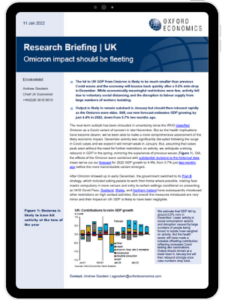Omicron impact should be fleeting for United Kingdom

The hit to UK GDP from Omicron is likely to be much smaller than previous Covid waves and the economy will bounce back quickly after a 0.6% m/m drop in December. While economically meaningful restrictions were few, activity fell due to voluntary social distancing and the disruption to labour supply from large numbers of workers isolating.
What you will learn:
- Output is likely to remain subdued in January but should then rebound rapidly as the Omicron wave ebbs. Still, our new forecast estimates GDP growing by just 4.4% in 2022, down from 5.7% two months ago.
- Nevertheless, a number of high-frequency sources report a marked drop in social consumption activity in December. Most notably, CHAPS data showed a 20ppt decline in debit and credit card spending on social activities during the month.
- Given the relative lack of meaningful restrictions, we attribute the slump in activity to two factors. First, some consumers have adopted a more cautious approach to social consumption given the greater transmissibility of Omicron. Second, the sheer number of cases means large numbers of people were forced to isolate.
Tags:
Related Services

Post
Eurozone: Little sign of harm from the Red Sea disruptions
The impact of Red Sea shipping disruption on the eurozone economy continues to be limited, in line with our baseline view. Our new Eurozone Supply Stress Indicator suggests that supply pressures have returned to normal following a period of easing in 2023.
Find Out More
Post
GCC: Key themes shaping city economies in the near term
For Gulf cities, the near-term outlook will be tied not only to the global macroeconomic backdrop, but also the progress of the diverse visions and strategies in the region. With the aim to diversify their economies and reduce the dependence on oil, Gulf states continue to invest in the non-oil economy and implement various reforms. That said, oil revenues remain key to funding diversification efforts.
Find Out More